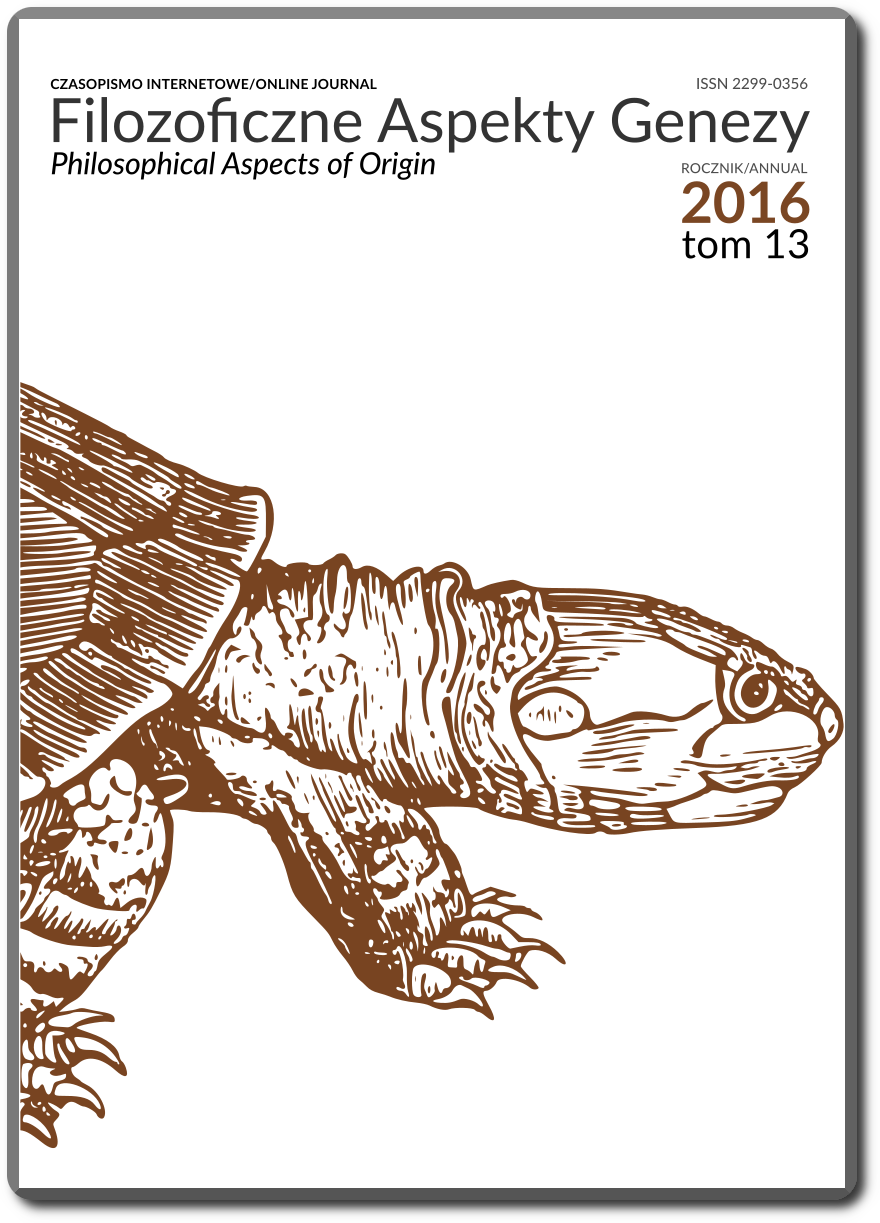Opublikowane 24.05.2021
Słowa kluczowe
- naturalizm filozoficzny,
- naturalizm metodologiczny,
- nadnaturalizm,
- nauka eksperymentalna,
- nauka o pochodzeniu
- cud,
- kreacjonizm,
- inteligentny projekt,
- zdarzenie,
- przyczyna ostateczna ...More

Utwór dostępny jest na licencji Creative Commons Uznanie autorstwa 4.0 Międzynarodowe.
Jak cytować
Abstrakt
Filozofia naturalizmu dominuje w myśli naukowej z powodów, które można wyjaśnić, wgłębiając się w jej historię. Niniejszy artykuł podejmuje się oceny charakteru i implikacji naturalizmu w sytuacji, gdy różne jego komponenty badane są oddzielnie. Naturalizm filozoficzny odrzuca możliwość istnienia Boga. Ten rodzaj naturalizmu jest czysto filozoficzny, a zatem nie może być poddany testom naukowym i nie będzie przedmiotem artykułu. Naturalizm metodologiczny (NM) to metoda uprawiania nauki, która nie bierze pod uwagę żadnych czynników o charakterze nadprzyrodzonym. Zdaje się, na pierwszy rzut oka, że jest to nieszkodliwy i konieczny element metody naukowej. Skoro jednak współcześni naukowcy działający w obrębie nauk eksperymentalnych lub obserwacyjnych nie zastanawiają się nad tym, czy powinni uwzględniać przyczyny nadnaturalne w swoich wyjaśnieniach, to trudno twierdzić, że naturalizm metodologiczny jest tej sferze nauki niezbędny. Niemniej, badając historię (na przykład geologiczną lub biologiczną) należy podjąć decyzję, co począć z NM. W artykule zawarto stwierdzenie, że gdy zbadanie świadectw pewnych zdarzeń historycznych jest możliwe, są one pełnoprawnym przedmiotem badań naukowych, nawet jeśli nauka nie może rozważyć wszystkich ich możliwych przyczyn. Przykładem niech będą świadectwa nagłych i rozległych procesów geologicznych, które mogą sugerować (zapoczątkowany przez Boga) globalny potop jako ich przyczynę.
Downloads
Bibliografia
- Ger Derek V., The Nature of the Stratigraphical Record, 2nd ed., John Wiley and Sons, New York 1981.
- Albritton Claude C., Jr., Catastrophic Episodes in Earth History, Chapman and Hall, New York 1989.
- „Analysis of Dinosaur Bone Cells Confirms Ancient Protein Preservation”, Science Daily 23 October 2012, https://www.sciencedaily.com/releases/2012/10/121023151333.htm (29.04.2017).
- Behe Michael J., Czarna skrzynka Darwina. Biochemiczne wyzwanie dla ewolucjonizmu, przeł. Dariusz Sagan, Biblioteka Filozoficznych Aspektów Genezy, t. 4, Wydawnictwo MEGAS, Warszawa 2008.
- Behe Michael J., The Edge of Evolution, Free Press, New York 2007.
- Berggren William A. and Van Couvering John A. (eds.), Catastrophes and Earth History: The New Uniformitarianism, Princeton University Press, Princeton, New Jersey 1984.
- Brand Leonard R., Esperante Raúl, Chadwick Arthur, Poma Orlando, and Alomίa Merling, „Fossil Whale Preservation Implies High Diatom Accumulation Rate in the Miocene-Pliocene Pisco Formation of Peru”, Geology 2004, vol. 32, s. 165-168.
- Coyne Jerry A., Why Evolution Is True, Penguin Books, New York 2009.
- De Renzi Miquel, Alonso Miguel, Belinchón Margarita, Peñalver Enrique, Montoya Plinio, and Márquez-Aliaga Ana (eds.), Current Topics on Taphonomy and Fossilization, International Conference Taphos 2002, 3rd Meeting on Taphonomy and Fossilization, Valencia, Spain 2002.
- Esperante Raúl, Brand Leonard R., Chadwick Arthur, and Poma Orlando, „Taphonomy of Fossil Whales in the Diatomaceous Sediments of the Miocene/Pliocene Pisco Formation, Peru”, w: De Renzi, Alonso, Belinchón, Peñalver, Montoya, and Márquez-Aliaga (eds.), Current Topics on Taphonomy…, s. 337-343.
- Esperante Raúl, Brand Leonard R., Nick Kevin E., Poma Orlando, and Urbina Mario, „Exceptional Occurrence of Fossil Baleen in Shallow Marine Sediments of the Neogene Pisco Formation, Southern Peru”, Palaeogeography, Palaeoclimatology, Palaeoecology 2008, vol. 257, s. 344-360.
- Froom Le Roy Edwin, Prophetic Faith of Our Fathers, vol. 2, Review and Herald Publishing Association, Washington, DC. 1946.
- Gould Stephen Jay, „Lyell’s Vision and Rhetoric”, w: Berggren and Van Couvering (eds.), Catastrophes and Earth History…, s. 9-34.
- Hofreiter Michael, Collins Matthew, and Stewart John R., „Ancient Biomolecules in Quaternary Palaeoecology”, Quaternary Science Reviews 2012, vol. 33, s. 1-13.
- Huggett Richard, Catastrophism: Systems of Earth History, Edward Arnold, New York 1990.
- Lyell Charles, Principles of Geology, 3 vols., John Murray, London 1830-1833.
- McGrath Alister, The Twilight of Atheism, Doubleday, New York 2004.
- Meyer Stephen C., Signature in the Cell, HarperOne, New York 2009.
- Miller Keith B., „The Misguided Attack on Methodological Naturalism”, w: Schneiderman and Allmon (eds.), For the Rock Record…, s. 117-140.
- Miller Kenneth R., Finding Darwin’s God: A Scientist’s Search for Common Ground Between God and Evolution, Harper Collins, New York 2000.
- Pennock Robert T., „Can’t Philosophers Tell the Difference Between Science and Religion? Demarcation Revisited”, w: Pennock and Ruse (eds.), But Is It Science…, s. 546-565.
- Pennock Robert T., Tower of Babel, MIT Press, Cambridge, Massachusetts 1999.
- Pennock Robert T. and Ruse Michael (eds.), But Is It Science?, Prometheus Books, Amherst, New York 2009.
- Plantinga Alvin, „Methodological Naturalism?”, Origins and Design 1997, vol. 18, no. 1.
- Plantinga Alvin, „Naturalizm metodologiczny?”, przeł. Radosław Plato, Filozoficzne Aspekty Genezy 2014, t. 11, s. 37-93.
- Schneiderman Jill S. and Allmon Warren D. (eds.), For the Rock Record, University of California Press, Berkeley, California 2009.
- Schweitzer Mary Higby, Zheng Wenxia, Cleland Timothy P., and Bern Marshall, „Molecular Analysis of Dinosaur Osteocytes Support the Presence of Endogenous Molecules”, Bone 2012, vol. 52, s. 414-423, doi: 10.1016/j.bone.2012.10.010.
- Shapiro James, Evolution: A View From the 21st Century, FT Press, Upper Saddle River, New Jersey 2011.
- Soennichsen John, Bretz’s Flood, Sasquatch Books, Seattle, Washington 2008.
- Thaxton Charles B., Bradley Walter R., and Olsen Roger L., The Mystery of Life’s Origin: Reassessing Current Theories, Philosophical Library, New York 1984.
- Valentine James W., „The Present Is the Key to the Present”, Journal of Geological Education 1966, vol. 14, no. 2, s. 59-60.



